




Executive Board: Rick Laws Chair Andy Kim Vice-Chair Morgan Fisher Secretary Madalaine L. How Treasurer
Stephen R. Farrow Immediate Past Chair
Michael P. Dunn Member at Large
Monica Escalante President & CEO
Board Members: Colleen "Cam" Bunting
David "Buddy" A. Dykes
Simona Eng
Parisa Gholamvand
Roger L. Harrell
Lakeisha Harris
Robert M. Purcell
Tina Reid
Anthony S. Sarbanes
Sharon Washington Margaret M. Whitten
You’d be surprised to know that even though Coastal Hospice has been caring for patients and families of the Eastern Shore for more than 40 years, it is not uncommon for our staff to hear the question: What is hospice? The short answer is that hospice care is a special kind of care that focuses on the quality of life for people who are experiencing an advanced, lifelimiting illness. This definition, while accurate, does not describe the vital care that our staff provide.
Monica Escalante President
Our team enters a family’s life at the most vulnerable time and becomes a circle of support that wraps the family with compassion and clinical expertise. Our nurses are skilled at providing palliative care in homes. They work with our doctors and nurse practitioners providing advanced medications that palliate all symptoms so that patients feel better than they’ve felt in a long time after being admitted. Our social workers support the families in many different ways, encouraging them to access resources they might have not been aware of and our spiritual counselors accompany and console patients and family members. Our nurses’ aides soothe patients, giving bed baths when they become bedbound and providing gentle and compassionate personal care. We also have volunteers that provide respite care and support families with various needs. Our bereavement counselors support family members for a year after their loved one passes and they also offer numerous support groups throughout the year. In some cases, we have music therapists, physical therapies, among others. All this care is offered in the comfort of patient’s homes or wherever they call home.
It is this well coordinated effort that keeps us among the highest rated hospices in the state of Maryland — according to the most recent Medicare national survey. Every year, the Consumer Assessment of Healthcare Providers and Systems (CAHPS) ask a family member of a hospice patient about their hospice care experience. Coastal Hospice ranks above the state and the national average results in every single category. This is a testament to the commitment of our staff. To all of us, our work is not only a job, but a calling. We are all invested in providing the best possible care to every single patient and their family.
While our services are covered by Medicare, Medicaid, and private insurances, we remain committed to continue offering our care to everybody, regardless of their ability to pay. Unfortunately, the reimbursement we receive from Medicare and Medicaid has not kept up with inflation, and Medicare has reinstated the ‘sequestration’ of 2% of our revenue. This significantly reduces our resources and could limit our ability to provide charity care.
In the coming weeks we will be launching our Annual Be an Angel Appeal. This is the most important fundraising campaign for us. Last year, thanks to our community supporters, we were able to provide more than $363,000 in charity care, allowing us to care for the uninsured or unable to pay, as well as continuing offering services not reimbursed by Medicare, like Grief Support.
Coastal Hospice News is a quarterly publication edited by the Communications Department at Coastal Hospice, Inc.


Your help allows us to uphold our commitment of offering expert and compassionate care to our community and keep our focus on what matters most: supporting our patients and their families. Please remember Coastal Hospice in your holiday giving this year. No matter the amount, your donation will make a difference in the lives of many.
For more information, call 410-742-8732 or visit www.coastalhospice.org
In appreciation, Monica mescalante@coastalhospice.org

 By Maggie Miller
By Maggie Miller
I’ve been knitting since 2009. After exhausting all of my family, friends, and neighbors with hats, scarves, and baby blankets, I started looking for charities to knit for because I enjoy it that much! I retired from my job as a nurse/attorney in January 2016 and started volunteering with Coastal Hospice shortly thereafter as a patient care volunteer. I enjoy spending time with the patients in their homes or facilities and helping the caretakers get a little break during my visits. Sometimes we talk, sometimes I’m just there to give the family respite. I also serve on the Ethics Committee, have attended health fairs and Speaker's Bureau events to promote Advanced Directives, volunteered in the medical records department, and have been an elf during the annual Santa Run!
In 2016, the volunteer coordinator at that time was also a knitter and between us, we agreed to start a knitting/crocheting group specifically for our Hospice patients’ benefit. We started knitting as a group at a local yarn shop in Berlin, which now is sadly out of business. We then moved to a coffee shop, the library and then to the Macky & Pam Stansell House of Coastal Hospice in Ocean Pines. We were generously offered a place to gather there, as well as a place to store the many skeins of yarn that were donated by community members. COVID put a damper on meeting there, but we continued to meet, knitting in parks and on my deck with an outdoor heater! I delivered yarn to the group members homes to keep them knitting through this time and the group remained prolific, creating many items for the hospice patients. Most recently, we have been graciously invited to meet at the Art League of Ocean City. We started on September 8th from 10:00 a.m. to 12:00 p.m. and meet monthly every second Tuesday (See page 2). I’m hoping lots of the old members come and we can attract some new ones too!
What do we knit/crochet for the hospice patients? We only use acrylic yarn for washability and to minimize allergic reactions. We make blankets either individually or as a group by knitting or crocheting 8” squares, which are then sewn together into a blanket. The red white and blue blankets are distributed to our patients who are veterans (as part of our “We Honor Veterans” program). All blankets must measure a minimum of 48” x 40”. We are not able to use blankets smaller than that. Often the families keep these blankets after their loved one passes as a remembrance.

We also make Twiddle Muffs, which are very much appreciated by our nurses for patients who have dementia of all kinds. Twiddle Muffs are made with various colors, patterns and textures of yarn about 12” long, double thickness. Then we sew on buttons, beads, bells, zippers, ribbons— anything that is tactile so a patient can feel and “twiddle”. The nurses and families tell us it calms the patients and they become really attached to their muffs. The muffs keep their hands warm and offers them a focus as they touch the various textures. These too are often kept by the family as a remembrance.
So why do I do this? I love knitting and I love the staff at Coastal Hospice! As a patient care volunteer and a member of the knitting group, I have a chance to give back to my community, which I find very important. I can’t imagine a better way to spend my time.
The Coastal Hospice Knitting Group meets at the Art League of Ocean City on the following Thursdays in 2022 from 10:00 a.m. to 12:00 p.m.
Moderator Maggie Miller:
• October 13
• November 10
• December 8
To register, visit artleagueofoceancity.org and sign up for upcoming dates.
If you are interested in Knitting or becoming a Coastal Hospice Volunteer, please contact Volunteer Services at volservices@coastalhospice.org , by phone: 410-543-2590 or by visiting our website at www.coastalhospice.org/volunteer/

Why is supporting Coastal Hospice important to the Art League?
Rina Thaler: Art is such a universal thing, no matter what stage of life. Art heals, brings joy and comfort, self-actualization, and raises self-esteem. We found, once we did have the space, it was kind of like a blank canvas and what are we going to do with it? It’s more than just pictures on the wall. It’s how you can impact lives and transform lives through art. This is what has made the art unique and special. We partner with so many other nonprofits to serve the community through art. This is just a natural extension.


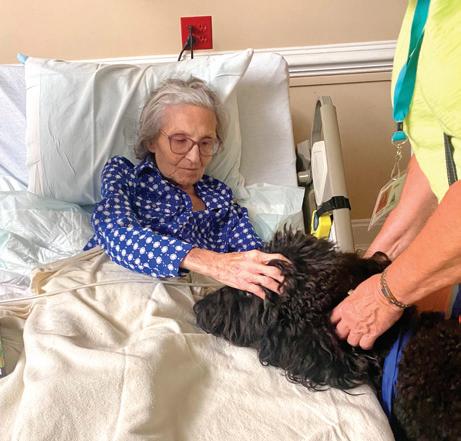 By Stephanie McClellan
By Stephanie McClellan
We are pleased to once again offer Pet Therapy to our patients at our inpatient facility, Coastal Hospice at the Lake. We have partnered with Pets on Wheels of Delmarva, the Wicomico Chapter and look forward to having additional volunteers visit our inpatient facility with their furry friends. Pets on Wheels Co-Coordinator, Ginny Lawrence is our first volunteer visiting patients with her dog, Watson.

If you are interested in becoming a Coastal Hospice Volunteer, please contact Volunteer Services at volservices@coastalhospice.org , by phone: 410-543-2590 or by visiting our website at www.coastalhospice.org/volunteer/
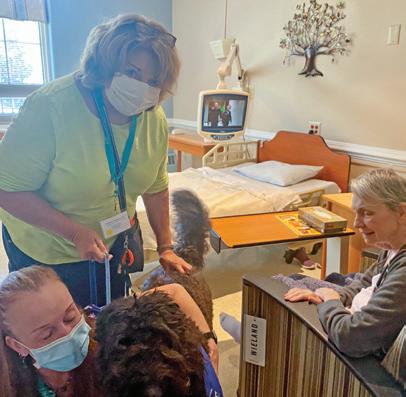
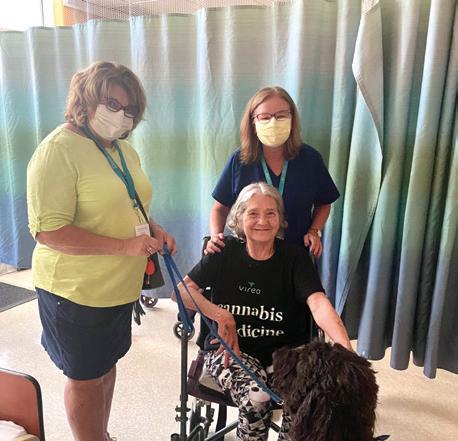
Any personal stories you may have with Coastal Hospice?
Rina Thaler: My Mother-in-Law had cancer and was treated by a Hospice in Florida, but we named the garden in front of the Macky & Pam Stansell House, Ruth Thaler Garden. My mother passed away during COVID and in her final days and weeks, she was cared for by Coastal Hospice.
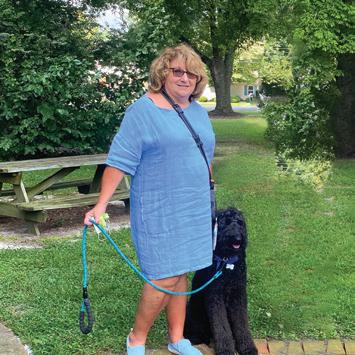
How long have you been working for The Art League?
Rina Thaler: I’ve been with the Art League for 23 Years. I was on the Board of Directors in 2000, then President of the Board and have been the Executive Director for the last 10 Years. When the original building on this property opened in the 1980’s, I began taking classes. I spearheaded the effort to raise funds to build the building we are sitting in now, which is on the same property. My husband owned an architectural engineering company and he designed it pro bono. When the new building opened, the Board of Directors surprised us and named the gallery after us, Rina & Jeff Thaler Gallery ! This has been a lifelong pursuit and I knew this town needed art. My children grew up creating
art here and when my Mother retired, she loved coming here. Our team here have been absolutely amazing through all these years and I couldn’t do it without them. Ocean City needed a cultural amenity. We are open 7 days a week, year round. Locals and tourists love visiting the gallery, purchasing art, attending classes, and enjoying the view of the Bay.
Katrin Huber, a German native, moved to the Eastern Shore from New York and begun working at the Art League of Ocean City as their Education Director in March 2015. Her daughter has attended the Art League since she was a little girl and has recently painted a portrait for an upcoming studio exhibit, Stigma Highlighted: Portraits of Recovery. This exhibit challenges misconceptions and negativity towards individuals battling addiction, showcasing portraits and stories of 12 individuals from the four Lower Shore counties.
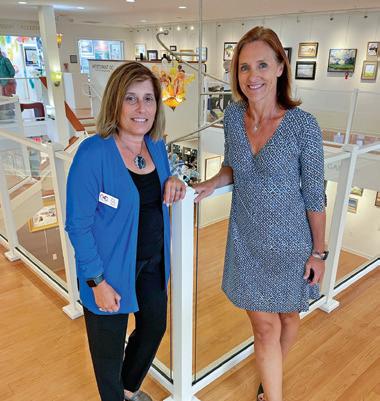


 By Alvin Harmon
By Alvin Harmon
If you are feeling like there is no light at the end of the tunnel, our free Coastal Hospice grief support groups will help guide you toward a place of healing and eventually finding a point where you are doing and living life better.
There is no special pill, no fixed amount of time and no specific set of instructions that will heal the pain associated with your grief and loss. Sensing that you are alone with your thoughts or feelings can be harmful to the healing process and produce a slow path to healing.
Being with others to help you deal with that sense of loneliness is where a Coastal Hospice Support Group can be beneficial. Our support groups can be used in conjunction with personal grief counseling and help create added support in your healing process.
As part of a group, you have a great opportunity to connect and create bonds with people who just like you, are dealing with the loss of someone they love. Joining a Coastal Hospice Support Group is a great opportunity to hear what others have learned to do when coping with grief and loss.
Group participants share first hand, real life experiences of their grief process and you can hear how many have managed their feelings at different places in the journey. You will be able to learn from other people’s input and just maybe, at some point you’ll be able to offer some input of your own.
Privacy and intimacy make our Coastal Hospice Support Groups a very safe place to express yourself. These groups are facilitated by one of our grief professionals who know and understand the grieving process. We want to help you move forward in your life.
It is normal to grieve and you need to allow yourself the space to do so. Just know that there are others in our communities who are feeling many of the same feelings and are very supportive while you work things out.

We offer in-person and online 6-Week Bereavement Support Groups throughout the year. The purpose of these support groups is to provide an atmosphere of trust and acceptance in which participants may freely share their experiences, struggles, feelings, and concerns as well as their strengths, solutions, and joys. The groups will encourage participants to create friendships and network with each other.
We also offer Caregiver Support Groups for families and friends that are currently caring for a loved one and can use the extra support.
These activities are offered at no cost to any adult who has experienced the death of a loved one, even if they were not a patient of Coastal Hospice.
Dorchester County Support Group
One-on-one phone support or in person meeting available by request.
Bereavement Support Group — Worcester County
If interested in one-on-one phone support or in person, meetings are available by request.
Macky & Pam Stansell House
1500 Ocean Parkway, Ocean Pines 21811 Community Room (Ground Level)
MONDAYS | September 12 – October 17
4:00 P.M. - 5:00 P.M.*
Bereavement Support Group — Wicomico County
If interested in one-on-one phone support or in person, meetings are available by request.
Coastal Hospice Conference Room
1113 Healthway Drive, Salisbury, MD 21804
FRIDAYS | September 16 – October 28
1:00 P.M. - 2:00 P.M.*
Somerset County Support Group
One-on-one phone support or in person meeting available by request.
Annual Worcester County Memorial Gathering
Friday November 4, 2022 @ 2:00 p.m. – 4:00 p.m. Location: Ocean City Fishing Pier in Ocean City, MD
Coping with the Holidays (ONE DAY ONLY)
Saturday, November 19 @ 2:00 p.m. – 3:30 p.m. Community Foundation of the Eastern Shore 1324 Belmont Avenue Ste. 401 Salisbury MD, 21804 (East Park Professional CenterLarge Conference Room)
All four counties are welcome to these services. Visit our website: www.coastalhospice.org/events/
We like to care for our community. If you have a special request for Bereavement Care, please reach out to us.
Loss of a Pet – TUESDAYS, Nov. 29 - Jan. 3 5:00 p.m. - 6:00 p.m.
Loss of Adult Child – WEDNESDAYS, Nov. 30 - Jan. 4 5:00 p.m. – 6:00 p.m.
Loss by Suicide – THURSDAYS, Dec. 1 – Jan. 5 5:00 p.m. – 6:00 p.m.
Caregiver Support Group – Worcester County Macky & Pam Stansell House 1500 Ocean Parkway, Ocean Pines, MD 21811 Community Room (Ground Level)
MONDAYS | September 12 – October 17
1:00 P.M. – 2:00 P.M.*
*These groups are no longer taking new participants. Please visit our website for upcoming dates.
Please visit www.coastalhospice.org/events/ to register for these groups. For more information, contact Alvin Harmon, Bereavement Care Services Manager and Compass Manager at aharmon@coastalhospice.org or by phone: 410-742-8732 ext. 440
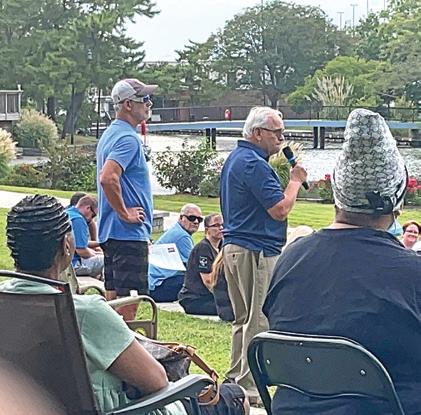
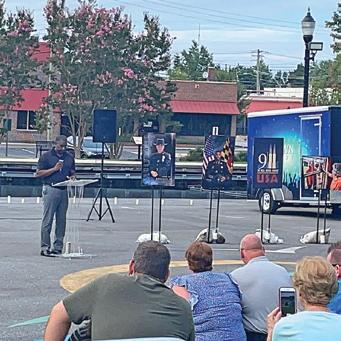
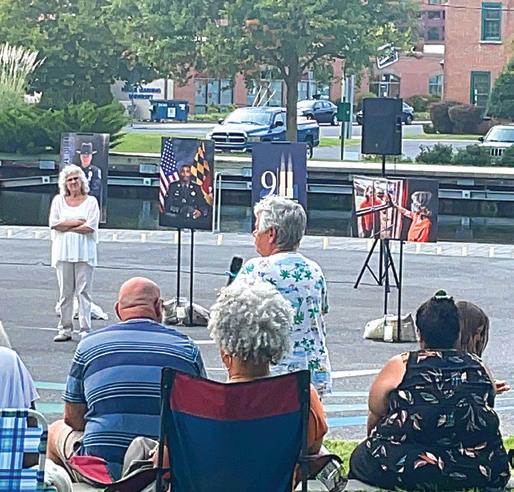
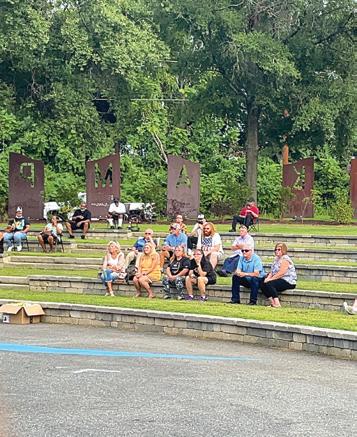 By Alvin Harmon
By Alvin Harmon
This was an amazing event in which we engaged all four counties of the Lower Eastern Shore. It was a beautiful time to honor the memories of the losses that have faced us as a community. Coastal Hospice supported families from all over the shore as they stood to share precious moments from the lives of their loved ones. We shared tears and hugs and each family represented took an opportunity to release a floating lantern into the Wicomico River to symbolize the life that meant so much to them.
Our final Memorial Gathering of 2022 will take place on Friday, November 4, from 2:00 p.m. to 4:00 p.m. at the Ocean City Fishing Pier.

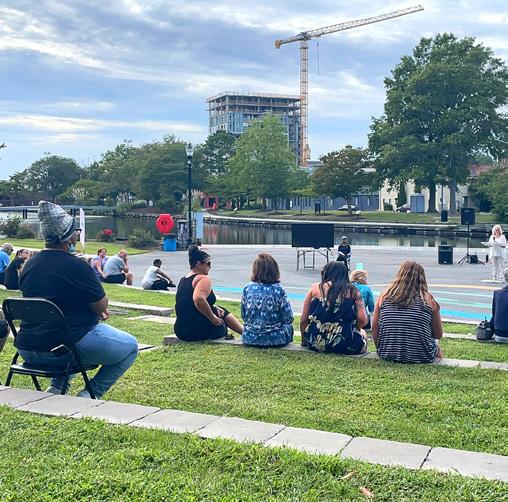
What should I say when I hear that my friend has cancer? How can I help but not get in the way? How do I let my loved ones know what I need?
The Etiquette of Illness is a wise, encouraging, and essential guide to navigating the complex terrain of illness. This collection of anecdotes and insights will help those who feel awkward and unsure about responding to a friend, colleague, or relative who is suffering. The book is also for people who are ill and want to engage with their loved ones effectively. We read about a range of people who are dealing with chronic illness, doctor-patient communications, and end-of-life issues-and who are striving to find their way with awareness and compassion.

Drawing on her years of counseling people with serious illness, as well as her own experiences with cancer, Susan Halpern presents an insightful book of the utmost relevance for patients, their caregivers, and their family and friends - a group which will, at some point, include all of us.


Fall is a season for gratitude. At the Caregiver Academy, we are very thankful for the wonderful welcoming we receive every month by healthcare professionals and caregivers in our community. During these past months we have offered online programs aimed to educate professionals in hospice and palliative care as well as support those who care for loved ones at home.
With each program we are not only offering vital education but we are also learning – through the attendees’ participation and feedback about the challenges and needs that our caregivers face on a daily basis. This is helping us shape the lineup of programs that we are planning for upcoming months and inspires us to continue bringing topnotch content to our community. We appreciate your feedback after every program and invite you to send us your comments and suggestions.
This summer an expert panel lead by Dr. Ghulam Waris, F.A.A.G.M., Coastal Hospice Chief Medical Director offered the program “Pain Management in Palliative Care”. Along with Don D’Aquila, Pharm. D., BCGP, RRT from the University of Maryland Medical System and Ann Lovely, RN, BSN, CHPN, Director of Quality Assurance and Performance Improvement, Education and Compliance at Coastal Hospice, they addressed the importance of the multidisciplinary team approach and the impact that appropriate pain management has in the quality of life for patients and their families. Physicians, Nurses, and Social Workers in attendance received free Continuing Education Credits (CEs).
Did you know that 1.8 million people over the age of 65 are treated in an emergency room as a result of a fall? This is an astounding number that our presenters
Director
Robby Chin, Health and Wellness Coordinator from MAC, Inc. and Nicole Moore, Home Hospice Team Leader at Coastal Hospice presented last month in the program “Safety Frist: Slips, Trips. & Falls.” They offered a plethora of information on how to minimize the risks of injuries and be safe at home. Visit our website to watch this program and many other recordings we have.
As I type this, our team is working hard planning new and exciting programs for the upcoming months, including how to know when a patient may benefit from hospice care, grief during the holidays, and so much more. Please visit our website to register for programs and learn more about the Caregiver Academy.
Wishing you a wonderful holiday season,
Grief During the Holidays: Tools to Cope with Loss Tuesday, October 25 12:00 p.m. – 1:00 p.m.
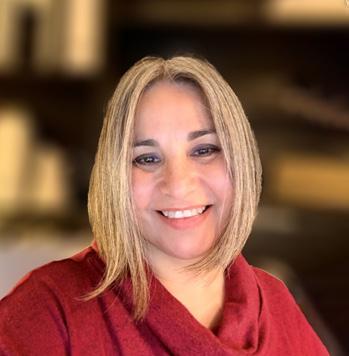
Meet the Hospice Interdisciplinary Team: Your Circle of Support Tuesday November 15 12:00 p.m. – 1:00 p.m.
To register, visit our website: www.coastalhospice.org/ caregiveracademy
and the Caregiver Academy Program Manager.
Death
touches children, as it does adults, in profound and life defining ways. Yet, there are often fewer resources available to assist children in processing death and the changes it brings in their lives. Children who have faced the death of a parent, grandparent, sibling or other special person often feel isolated as they struggle to find the words or the courage to talk about this painful experience.
Camp Safe Harbor provides an opportunity for children to share their experience of death and loss in a safe environment. In addition to children from hospice families, Camp Safe Harbor also supports children who are referred by school personnel or counselors/therapists from Wicomico, Worcester , Somerset, and Dorchester counties. Hospice professionals, who are trained in grief and loss, offer support, empathy, and tools for managing the many emotions that accompany facing life after the death of a loved one. Children feel less alone among peers who have shared a similar experience. Watching the campers bond and grow in their trust for each other and for the adults who are there to support them is amazing! The impact of the camp is far reaching and the benefit to children who attend is great.
This experience could not happen without the collaborative efforts of so many people. The partnership between Coastal Hospice and Salisbury University is a
unique element of the camp. To our knowledge, this University/Hospice model is not replicated anywhere else in the country. We are so grateful to Salisbury University and Dr. Kim van Vulpen for joining us in this venture and hosting the camp on their beautiful campus. We are also grateful for the dedicated hospice staff and volunteers who bring so much love and compassion to the campers. They also bring enthusiasm for mentoring future professionals, eager and energetic Salisbury University students who join us for this experience. Finally, there are individuals and businesses throughout our community who have helped support the camp through donations of items or services to benefit the needs of individual campers.
Camp Safe Harbor holds a special place in the life and work of Coastal Hospice and in the scope of available opportunities on the Lower Eastern Shore for supporting our community’s children. Families in need of this support for their children can learn more about Camp Safe Harbor 2023 by contacting Sharon Hutchison.
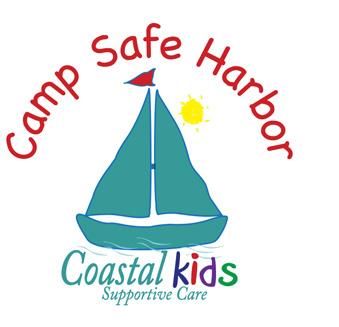
Sharon Hutchison is our Spiritual Care Services Manager. To learn more about Spiritual Care and Camp Safe Harbor, please contact Sharon Hutchison at shutchison@coastalhospice.org, by phone: 410-742-8732 ext. 619
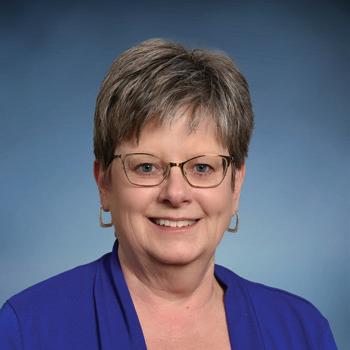
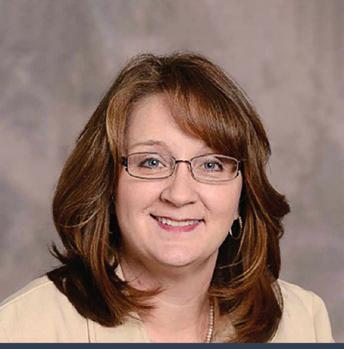
Salisbury University’s partnership through the School of Social Work and Coastal Hospice has been such an amazing collaboration. We know that this unique partnership not only offers an opportunity to address an important need in our community in providing grief support to children, but it also provides an opportunity for training future
social workers. As part of the collaboration, the School of Social Work at Salisbury University offers a social work elective course each summer to Bachelors and Masters level students, focusing on Children’s Grief and Bereavement. As part of the course requirements, the social work students serve as student camp counselors the week of Camp Safe Harbor working alongside Coastal Hospice bereavement professionals. This experience is a valuable capstone project in the course because it offers a wonderful learning opportunity that
Silly songs. Games. Laughter. Believe it or not, these are some of the things you can expect to hear at a grief camp for kids. You can also expect to see tears and kids needing solitude and extra, one-on-one support. What might surprise you is the beauty of watching kids share their stories with each other while comforting and encouraging one another. Children are naturally great grievers; you can trust them with the process.
At Camp Safe Harbor, we help kids understand that grief is a normal and healthy response to losing someone they love. We also help them understand what they can expect from the grieving process. We help them remember their loved one and remind them how resilient they are as they move forward in life without the physical presence of that loved one.
The week starts with an opening event for the whole family. The families work together to create a flag that represents the loved one they lost. They make yummy ice cream sundaes and THEN . . . these ridiculously brave kids stand up in front of a crowd of people they don’t know and share their flag, introducing their loved one to the group! It is so cool to watch these kids go from slipping glances at each other on the first night to crying and hugging each other good-bye four days later!
It is also fun to watch a group of adults – Salisbury University professors, social workers, therapists, chaplains, bereavement counselors, volunteers, and students – come together, meet one another, and become a cohesive team
within hours – ready to receive the campers and walk with them through a transformative week.
The schedule for the week is carefully balanced with therapeutic activities that are intensive and personal, along with activities that are pure fun, and physically challenging. Children are broken up into four, small groups that have three counselors each and the campers alternate between small group and large group activities throughout the day. We get to enjoy so much of what Salisbury University campus has to offer, including The Commons, Maggs Gym, the newsroom, the outdoor volleyball court, and indoor classrooms.
And then, at the end of the week we invite the campers’ families back for a closing ceremony. It is so fun to brag on the kids and show families pictures from the week. The camp ends as we invite everyone outside for a butterfly release as a way to bring closure, celebrate their loved one, and celebrate the good work they have done all week.
We invite you to feel proud of these kids, these families, and your community. The way so many come together to make this week possible and free of charge for these families … is truly inspiriting and beautiful. Well done, Salisbury!
Rev. Janelle Beiler, LCPC, NCC, AS, CT is our Pediatric Bereavement Counselor and Camp Safe Harbor Program Director. To learn more about Bereavement Care, please contact Janelle Beiler at jbeiler@ coastalhospice.org, by phone 410-742-8732 ext. 431

bridges classroom learning to real-life practice. The goal is to prepare future social workers to work with the growing need of grief and bereavement in our current society, while also providing a wonderful service in the community. We have seen the many benefits of Camp Safe Harbor. The child campers come to Salisbury University and get to spend several days on campus learning about grief, sharing their feelings, and also taking breaks to have fun. They develop important connections with their counselors and friendships with other children who have also experienced a loss. We know that feeling like others is
so important for the healing journey. The School of Social Work at Salisbury University is so proud to be part of Camp Safe Harbor each year.
Camp Safe Harbor offers a wonderful learning opportunity that bridges classroom learning to real-life practice.
For more information, please contact Dr. Kimberly van Vulpen, Associate Professor in the School of Social Work at Salisbury University at ksvanvulpen@salisbury.edu or by phone: 410-677-6506.
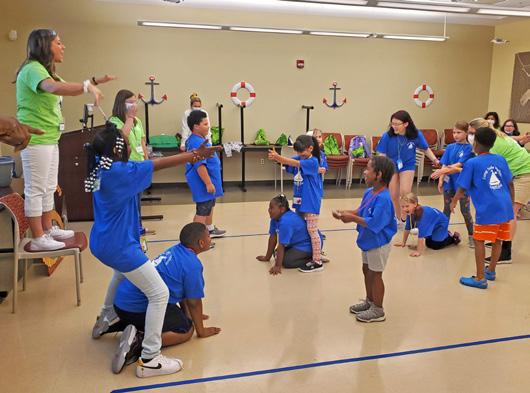
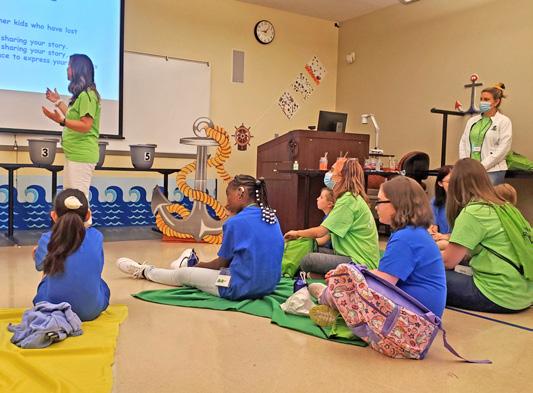


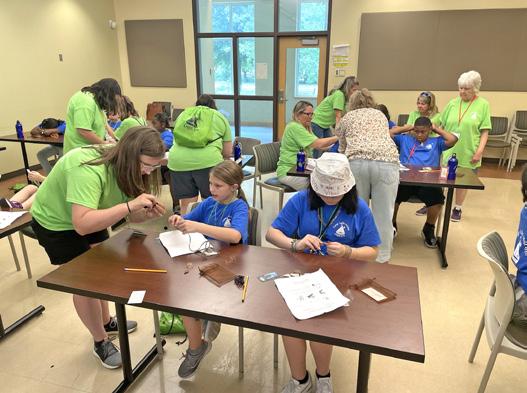





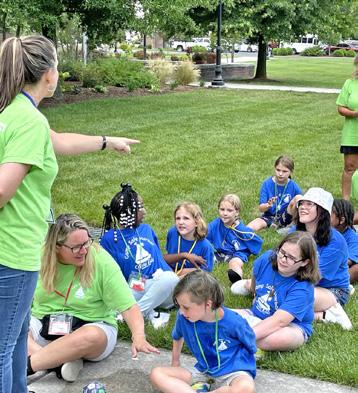
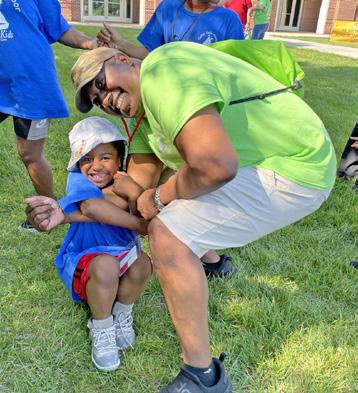
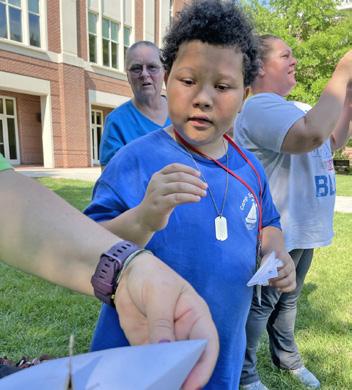
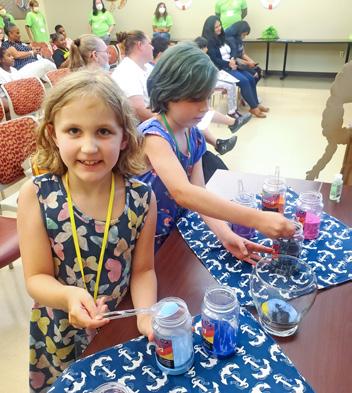
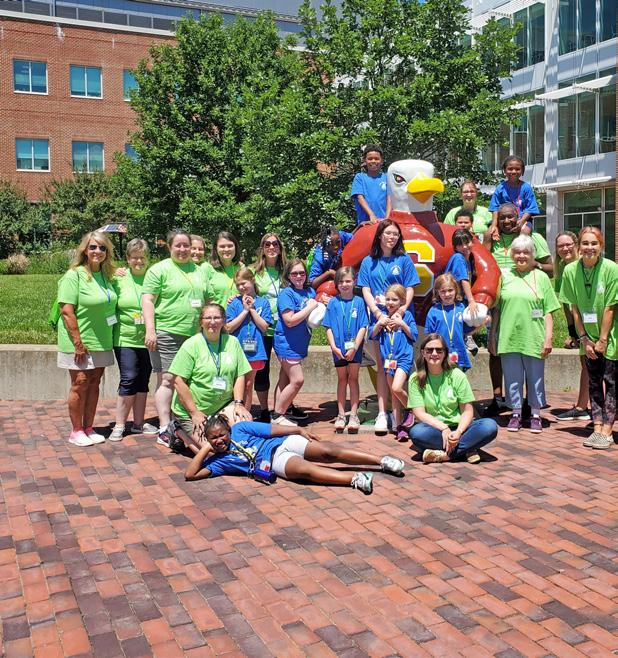

Prior to Camp Safe Harbor, My’Angel was extremely emotional and dejected. Grieving the loss of a parent at a young age is an indescribable notion. Camp Safe Harbor assisted My’Angel in the whole experience by introducing beneficial counsel and guidance. Experiencing other children’s parental losses, aided in a relief of tension. My’Angel recognizes “she is not alone” in her journey. Releasing a beautiful butterfly acknowledges her father is with us in spirit.

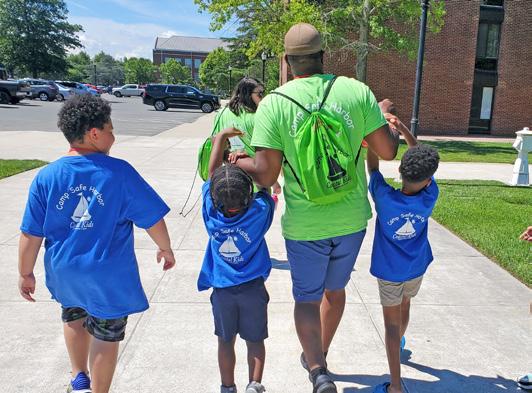
Encountering new peers and being loved by wonderful staff matters. We, thank you, Camp Safe Harbor of Salisbury, MD, for such a wonderful contribution during this process. Our family has comfort knowing My’Angel has a joy for peace.
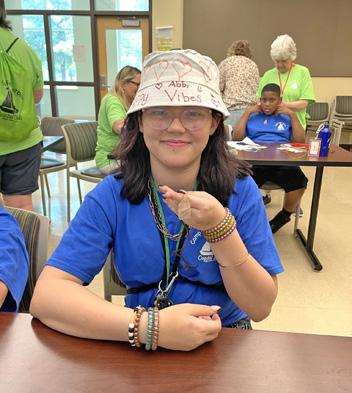
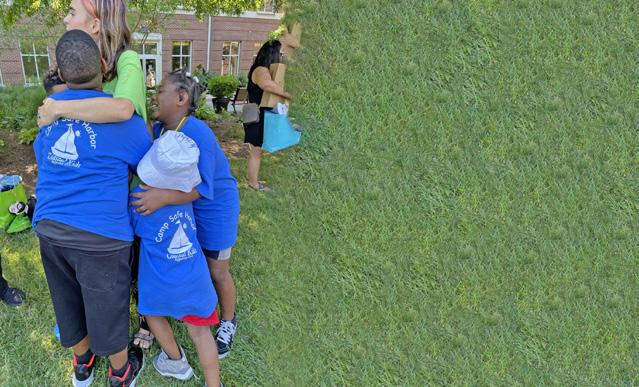



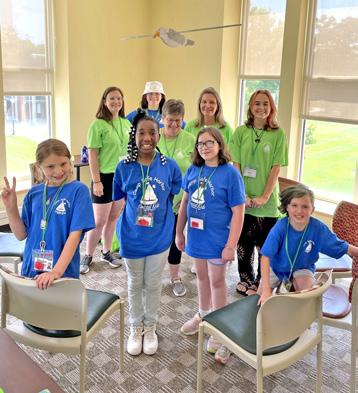
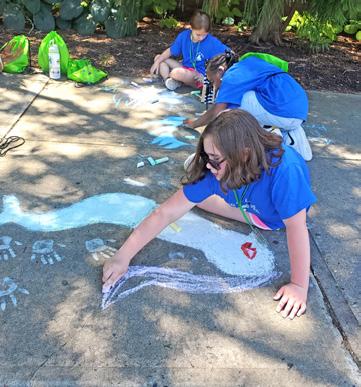
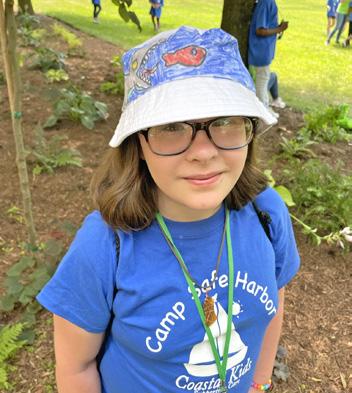
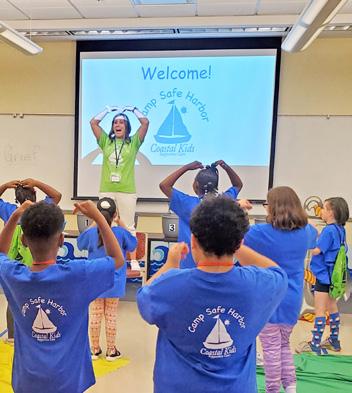
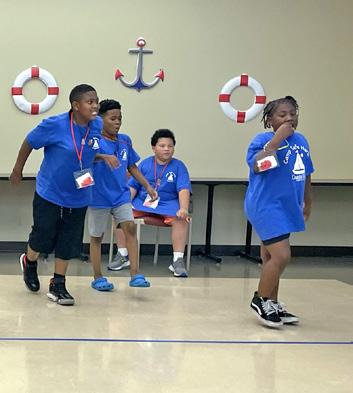





 By Arnold L. Bienstock
By Arnold L. Bienstock
Spiritual Care is the term used by hospice professionals to refer to the spiritual and emotional support given to hospice patients and their families as they navigate end of life. Hospice spiritual care professionals do not represent a specific faith perspective when they are providing care. The goal of the hospice staff member is to elicit and reflect upon the spiritual framework that is meaningful to the patient. The chaplain never imposes his or her belief system upon the patient and families. Because of this orientation, spiritual care professionals will most likely not wear religious jewelry or any other distinctive religious garb that would designate a particular faith. They will seldom share their own religious orientation with families. They listen to what inspires the patient and their families. They respond to the unique situation of each patient and family rather than focus on particular doctrines.
As the Eastern Shore of Maryland has become more culturally diverse in the past decade, the traditions represented in Coastal Hospice care have reflected this development. Coastal Hospice will frequently have patients from a variety of Protestant denominations – including “non-denominational” individuals, Catholic background, the Jewish and Islamic traditions, Hindu or Buddhist faiths perspectives. Many of our patients do not associate with any religious tradition. The spiritual care professional will focus on what gives these individuals purpose and meaning at this time in their lives. For our patients with a philosophical or theological orientation, the spiritual care professional will sometimes engage with the patient and families in discussion about the profound spiritual issues of life, such as the nature of human suffering. The most important gift that spiritual care professionals offer our patients and families is the art of listening – the professional listens while the patient and family talk.
Because of the significance of spiritual care at the end of life, CMS, the parent body of Medicare and Medicaid, requires all hospices to provide this support. Spiritual care is one of the basic disciplines of hospice care and its professionals are part of the “hospice team”. Like all hospice disciplines, the goal of spiritual care is to provide comfort and peace to our patients and their families.
Arnold Bienstock is one of our Spiritual Care Services Counselor. To learn more about Spiritual Care, please contact abienstock@coastalhospice.org , by phone email 410-742-8732 ext. 618 .
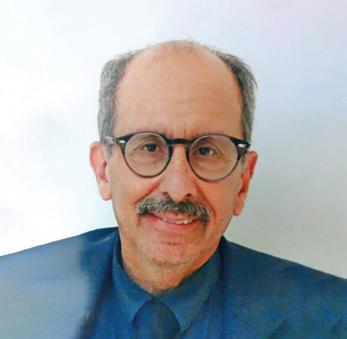
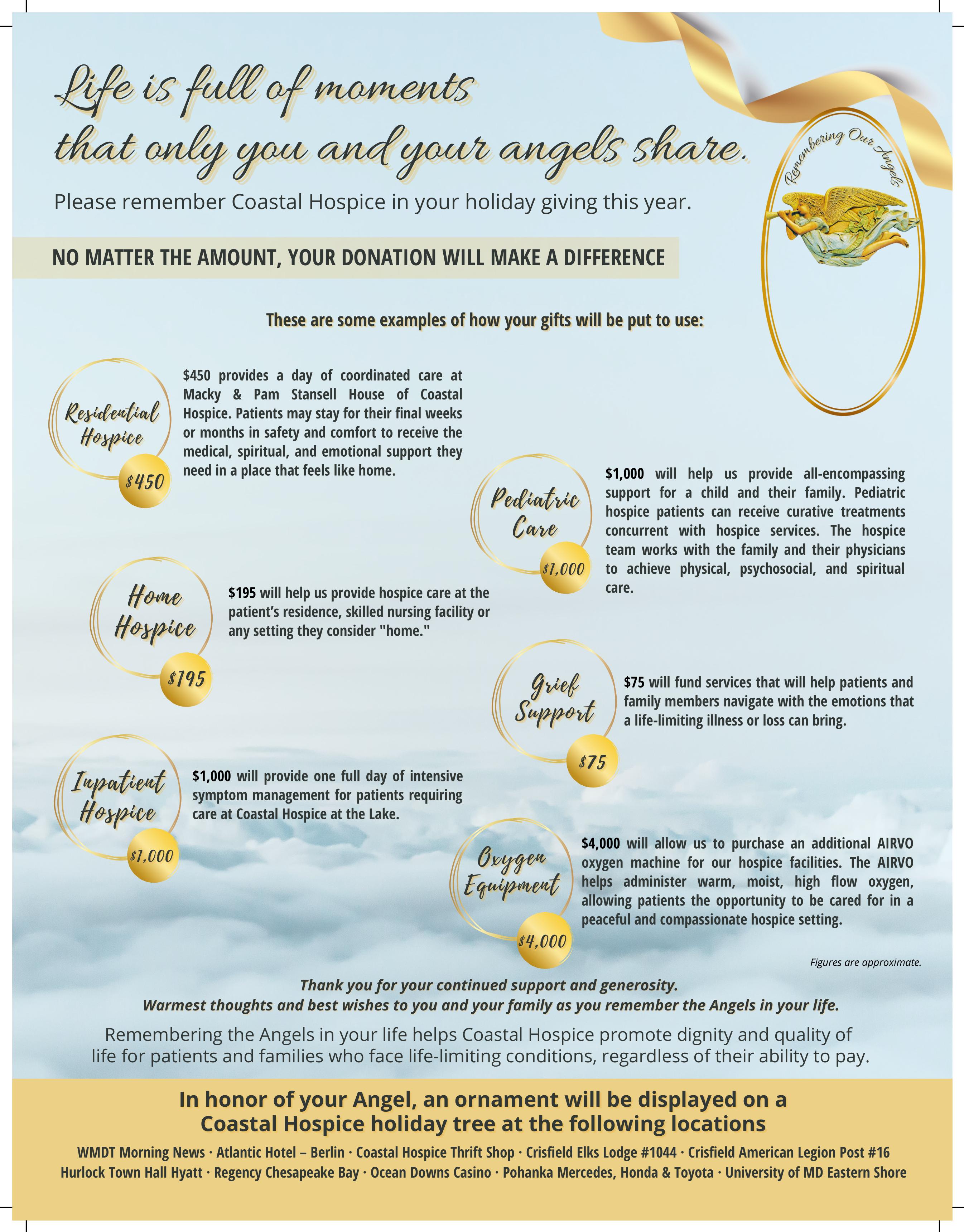



A power of attorney (POA) is a legal document in which a person appoints an agent, typically a spouse or an adult child, to act in that person’s place when he or she is absent or incapacitated.
Among other things, the agent can manage bank accounts and investments, pay bills, maintain real estate, and sign tax returns. In Maryland, the POA must be signed in the presence of a notary public with two witnesses present, one of which may be the notary. A properly executed “durable” POA will survive disability. In Maryland, a special “statutory” POA never expires, although the person executing it may revoke it if he or she regains the ability to manage their own affairs.
You may be unreachable during travel or certain types of hospitalization. Or you may develop a permanent and progressive mental incapacity like dementia. An effective, properly drafted POA will ensure that your financial and related affairs are taken care of in a legal fashion for the duration of your absence or temporary or permanent incapacity.
A POA automatically expires when you die. If you want to give someone the authority to manage your affairs after you die, you should make a will.
Should every adult have a POA and healthcare directive?

Yes. Consider the case of a 40-year-old single woman who developed a massive headache and then fell into a coma. Her parents tried to manage her financial and other matters, but, without a POA appointing them as her agents with the legal authority to act on her behalf, they
could not cancel her rental lease, talk with her employer’s human resources department, access her bank accounts, or discuss her treatment plan with the hospital and health insurance company. The only option for the parents was to obtain a guardianship for their daughter, which is time-consuming (in this case, a month), expensive, and requires the services of an attorney.
In another case, a woman placed her husband in a nearby nursing home after he developed dementia and could not be cared for at home. The couple’s joint savings account was depleted in months. The wife then tried to pull some equity from the house, but this proved impossible without the signature of her husband, who was on the title to the house. The lack of a POA meant she too had to resort to the expensive alternative of becoming her husband’s guardian.
Both situations could have been resolved in a straightforward, timely manner without additional legal costs if a POA had been in place before the individual became incapacitated. If you are 18 or above, you should have a POA.
To learn more about Maryland Power of Attorney, visit The People’s Law Library of Maryland: www.peoples-law.org/powers-attorney

Safia Kadir is a Coastal Hospice Volunteer and retired attorney at law. To learn more about our Volunteer program, please contact Volunteer Services at volservices@coastalhospice.org , by phone: 410-543-2590 or by visiting our website at www.coastalhospice.org/volunteer/
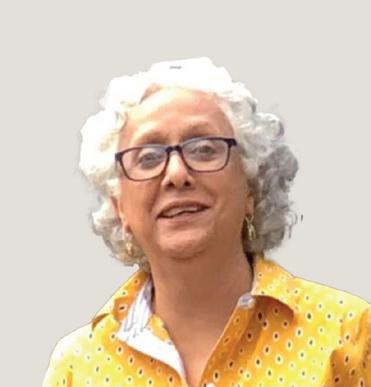


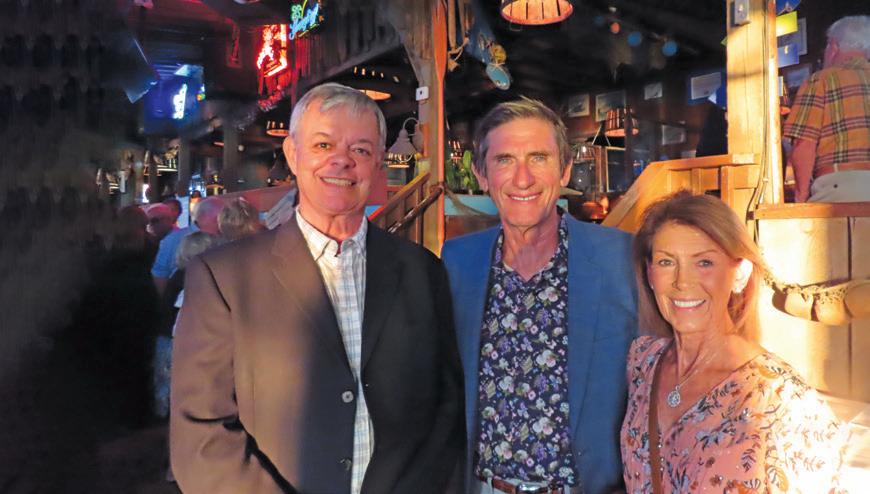
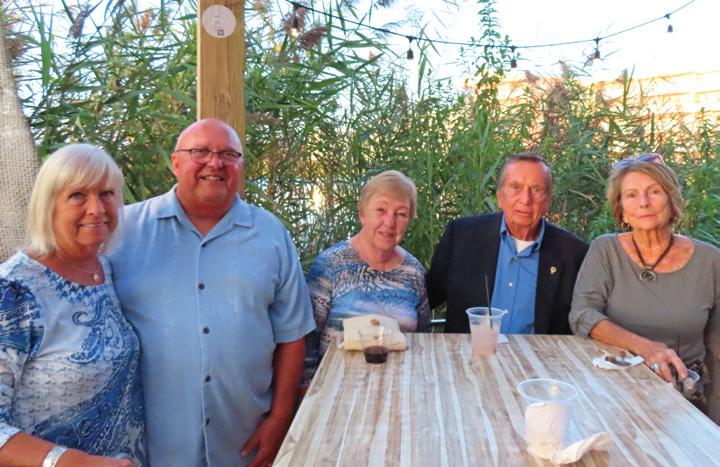
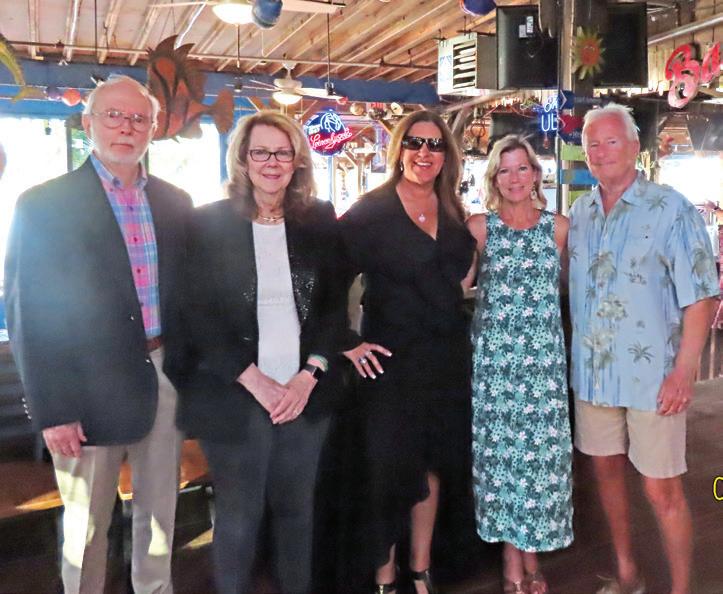



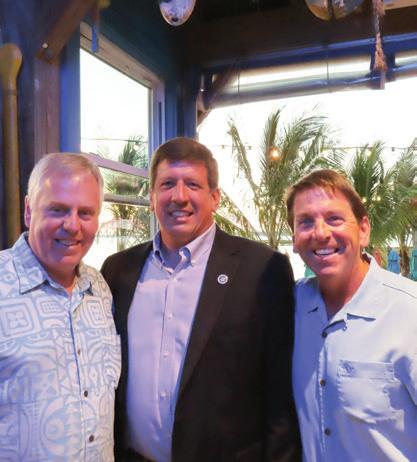
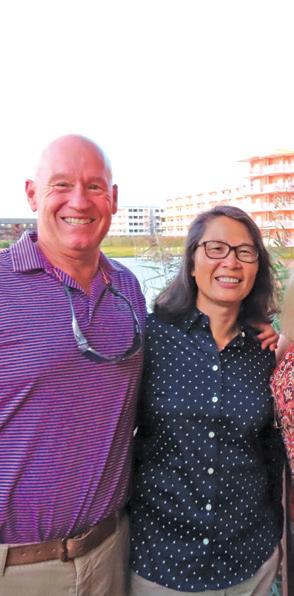
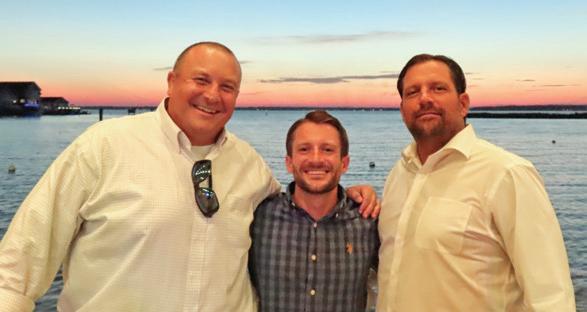
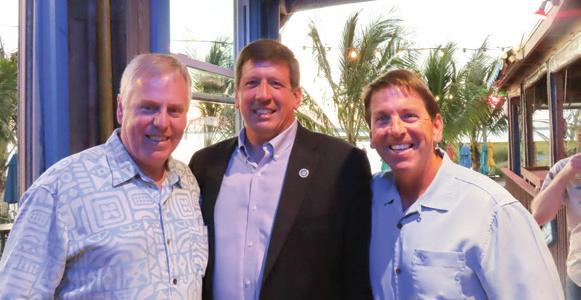
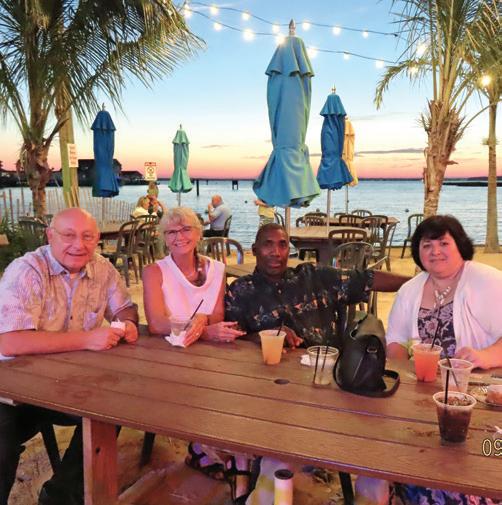

Blues on the Bay, one of our most anticipated events of the year, hosted by Macky and Pam Stansell at Macky’s Bayside Bar & Grill, once again was a sold-out event this past September, raising more than $67,500 for charitable care at the Macky & Pam Stansell House.

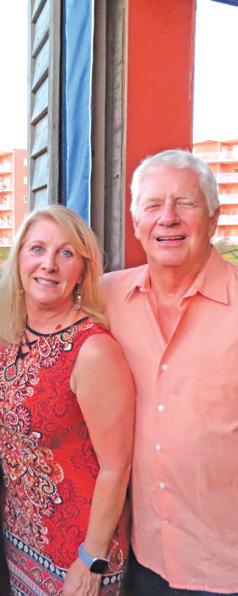


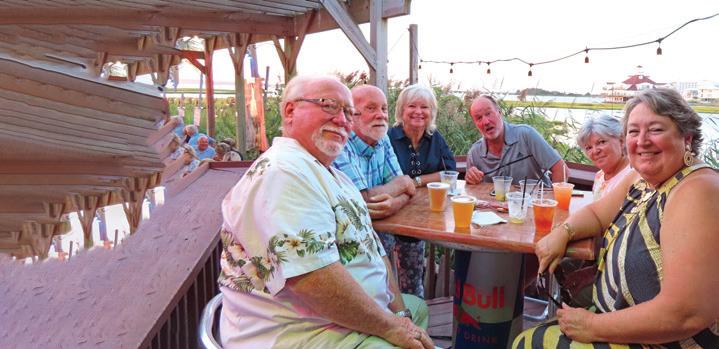
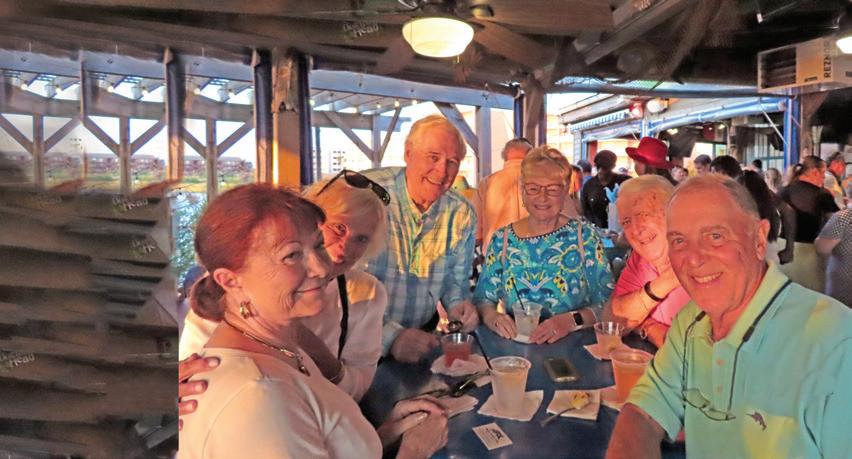
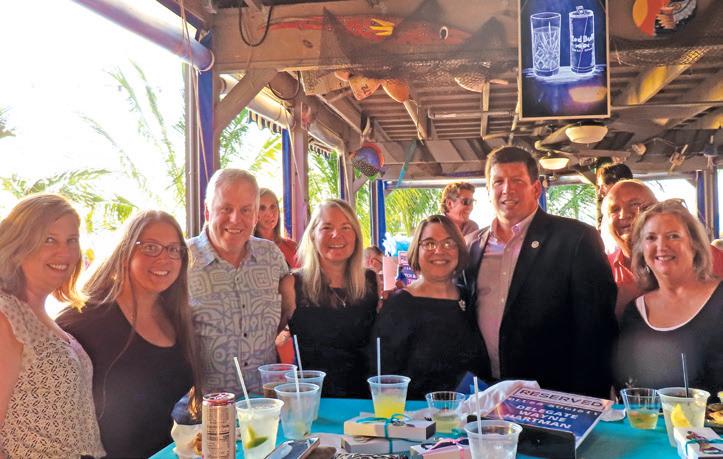
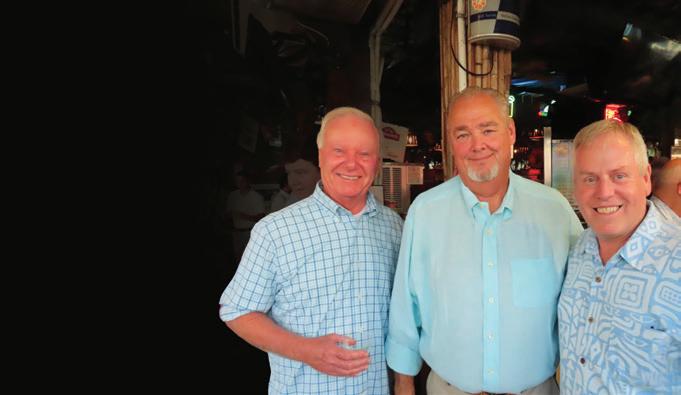


Friends were greeted and welcomed by Macky & Pam Stansell, where they enjoyed open bar, delicious heavy hors d’oeuvres, live entertainment by Everett Spells with a gorgeous front-row view of the sunset over the bay. Dirk Widdowson, Co-Chair of the Stansell House Campaign, along with Macky thanked the sponsors and guests for their commitment to continue supporting coordinated care for patients and families at our hospice residence – The Macky & Pam Stansell House of Coastal Hospice.
THANK YOU MACKY AND PAM FOR ALL YOU DO!
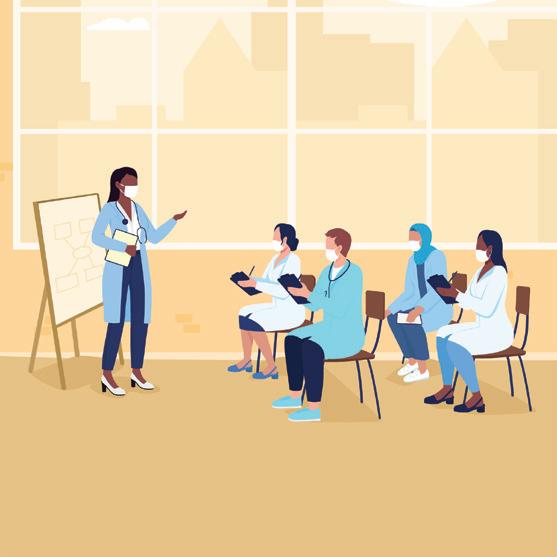
Coastal Hospice is a nonprofit 501(c)(3) organization that puts the needs of our patients first –regardless of their ability to pay. Donations to Coastal Hospice allow us to promote dignity and quality of life for patients and families who face life-limiting conditions.
Every Wednesday this summer, Brew River Seafood House & Dock Bar in Salisbury, Maryland hosted non-profits who, in addition to receiving 20% of their drink and food sales for the evening, will compete for a Grand Prize! At the end of the summer, the team with the most sales will win an additional $5,000 for their cause.
On August 17th, Coastal Hospice was invited to participate in this year’s Guest Bartending Competition. Lauren Blair, Provider & Community Relations Manager, Lauren King, Provider & Community Relations Liaison, and Jessica Schempp, Human Resources Manager stepped behind the bar to a packed house at Brew River and raised more than $1,000 for our patients! Many of our community partners from local hospitals, nursing homes,
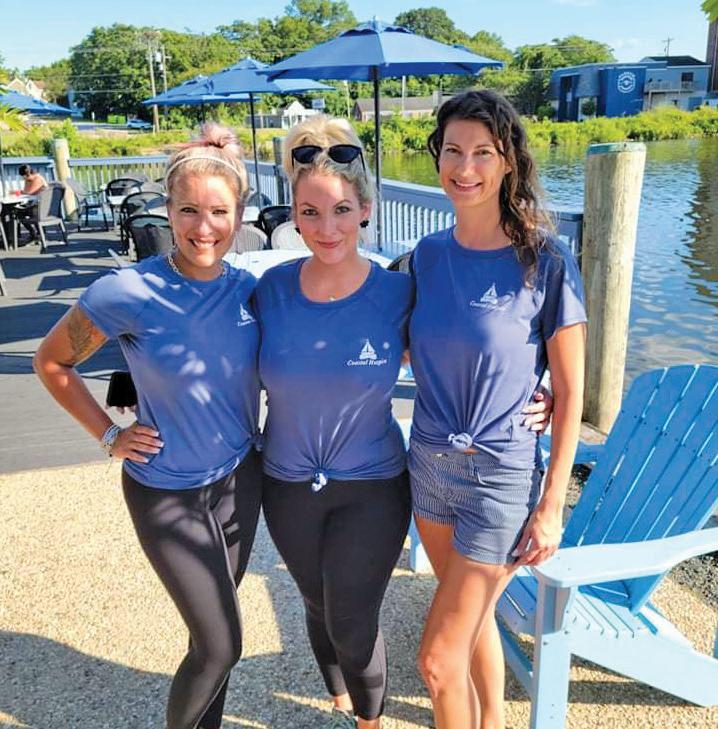
assisted living facilities, doctor’s offices, home health care agencies, and private care agencies came out to support Coastal Hospice.
One of the many ways that donations help our community is The Macky & Pam Stansell House. The Stansell House is committed to providing a safe, comfortable and compassionate place for hospice patients who cannot safely manage their care at home. The residence provides the dignity of hospice care with all of the comforts of home. There are times when patients do not have the financial ability to pay privately for the Stansell House room and board. When this occurs, we rely on these donations from the community to allow these patients to have the comfort and safety of our beautiful residential home located on the Isle of Wight Bay in Ocean Pines, Maryland.
Thank you to Brew River for giving us this opportunity to raise money and awareness for Coastal Hospice!
We recently had the opportunity to interview Dr. Velmourougane "Vel" Natesan, one of our community partners who has been supporting Coastal Hospice continuously for over 20 years. His practice, Natesan Medical Group, is located at 951 Mt. Hermon Rd, Salisbury, MD 21804 and is the largest internal medicine practice on Maryland’s Eastern Shore. Here is a look at our Q&A Session with Dr. Vel Natesan:
CH: Tell us about yourself.
VN: I am Dr. Vel Natesan. I am a Board certified Internist practicing medicine for 30 years. I came to Salisbury in 1998 and opened our private practice in 2000. I went to Medical school in Chennai India and completed my Internal Medicine training program in Union Memorial Hospital, Baltimore, MD.

CH: Where did you attend medical school?
VN: I went to Chennai Medical College in India
CH: How long has Natesan Medical Group been established?
VN: Natesan Medical group was started in the year 2000. I was myself when we started the practice. Six months in to the practice my wife Usha Natesan joined the practice and we grew into 7 provider practice to this date.
CH: What made you chose the medical field?
VN: When I grew up I always wanted to be a physician which I felt would be the most rewarding and satisfying field where I can help patients. I Love diagnosing and treating patients and improving their health gives so much satisfaction. Also I love the autonomy of running our own practice.
CH: How many practitioners are in your practice?
VN: We have 3 MDs, 3 Physician assistants and 1 Nurse Practitioner.
CH: Besides your practice, are there any other agencies you are affiliated with?
VN: We are affiliated with TidalHealth - We are part of Peninsula Regional Integrated Network which has several community medical practices closely working with Peninsula Regional Medical Center. We care for Patients at Encompass Rehabilitation Hospital, Manokin Manor Rehab Center which is skilled Nursing Facility and Lakeside Assisted Living.
CH: What insurances do you accept?
VN: We accept most insurances. Our majority patients are Medicare and CareFirst and other private insurances. We also have some Medicaid patients with dual eligibility.
CH: How long have you been utilizing Coastal Hospice for your patients who are facing life-limiting illnesses?
VN: We have been utilizing Coastal Hospice from early on. I would say from day 1. Hospice is such an important partner in health care delivery.
CH: What do you feel the benefits are of referring patients to Coastal Hospice?
VN: Coastal Hospice is a key player in our care delivery system. They have so much to offer to our patients who are at their end of life. They help our patients so much providing such a compassionate care. They make it a little bit easy to go through the end of life reducing the pain and suffering. We have personal experience using Coastal Hospice for my mother-in-law when she was diagnosed with terminal cancer. Every staff we interacted were so kind and helpful and attended to her with such a compassionate care.



Our Coastal Hospice staff and their families gathered at the Pocomoke River State Park - Shad Landing for a beautiful Family Fun Day, filled with food, music, games, and more!
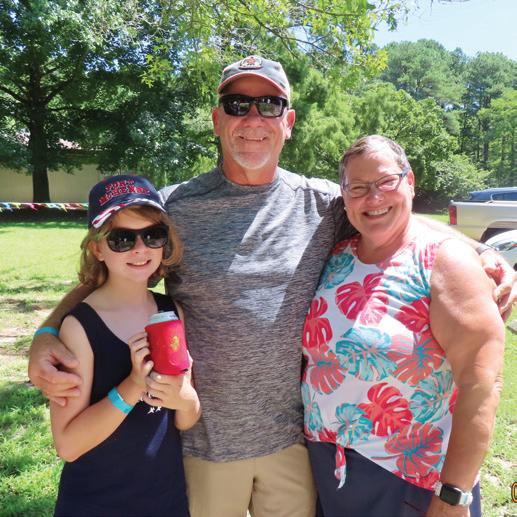
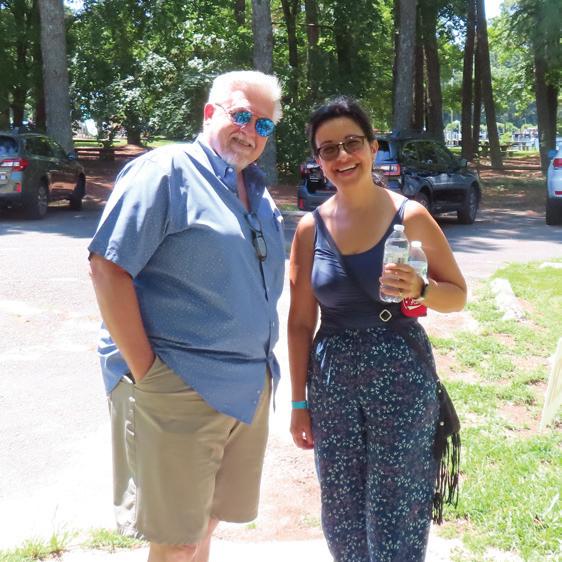

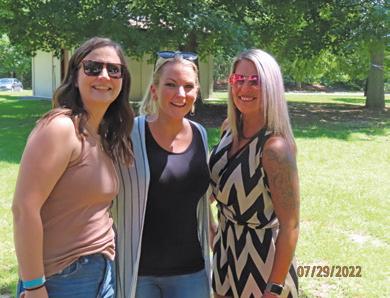

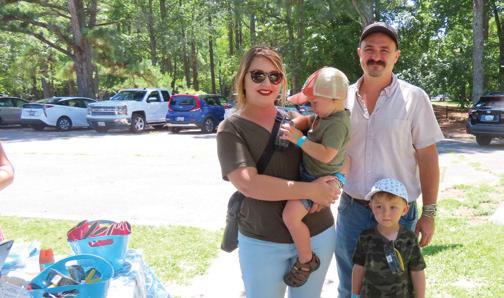
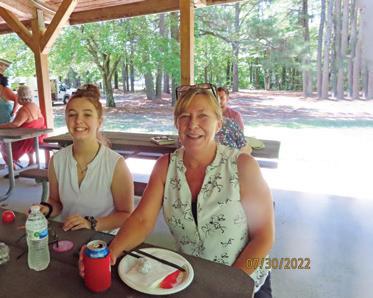
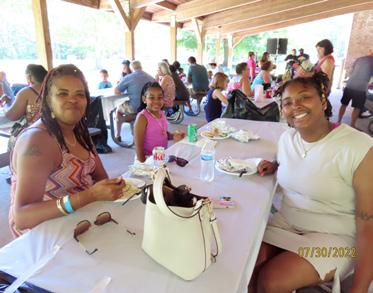
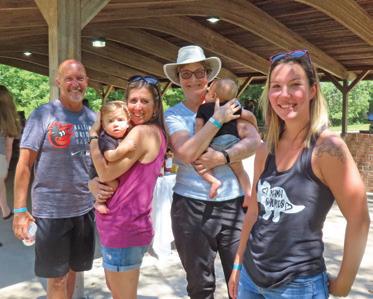
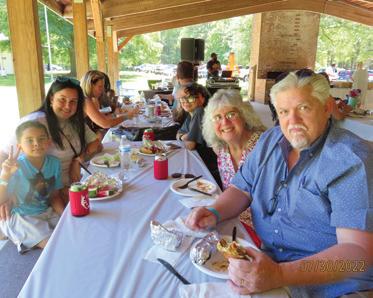
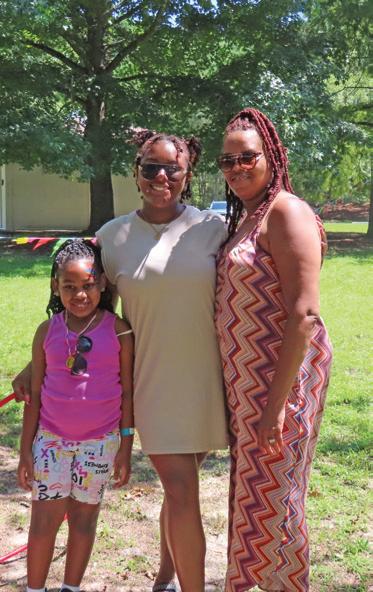
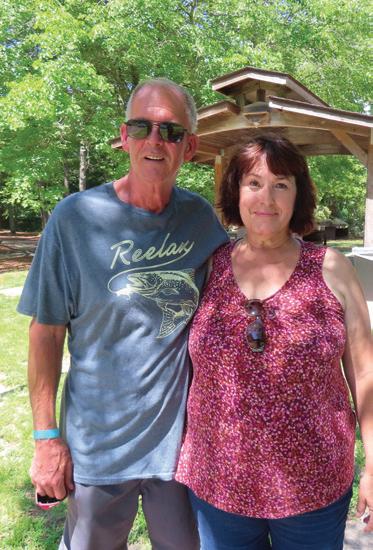



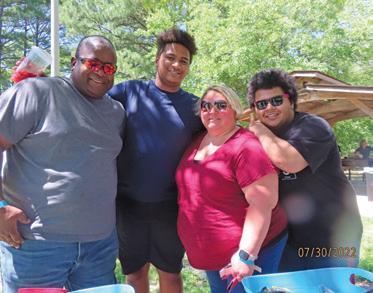
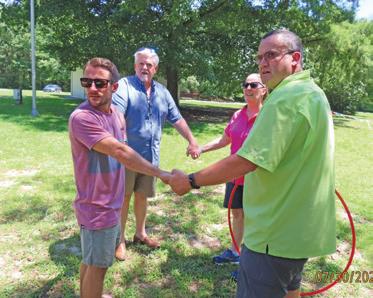
We are proud to announce our four Coastal Hospice Stars, who every day make a difference in the lives of those they care for.
Coastal Hospice stands behind its values of Respect, Compassion, Trust, and Resourcefulness. These stars represent and live these values every day through their work and unwavering commitment to the organization.
We truly thank them for being such a great example of what it means to work for Coastal Hospice!
We

We are thrilled and exceptionally proud of our very own Holly Murray, RN, BSN, CHPN, CM/DN being recognized as Coastal Style Best of 2022 Nurse in Worcester County! Holly is Team Leader for Coastal Hospice’s Fairwinds Care Team and this is the second time she has been awarded Best of Nurse in Worcester County in the last three years.

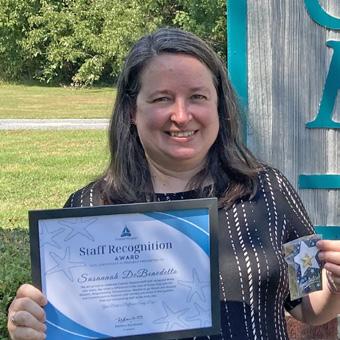
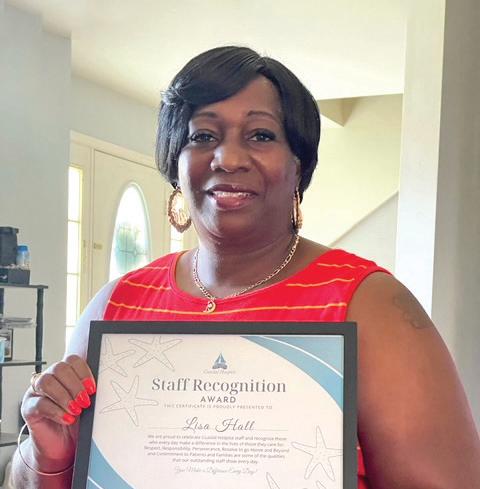
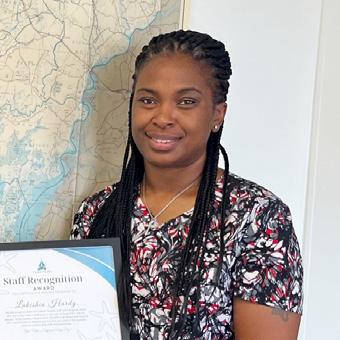
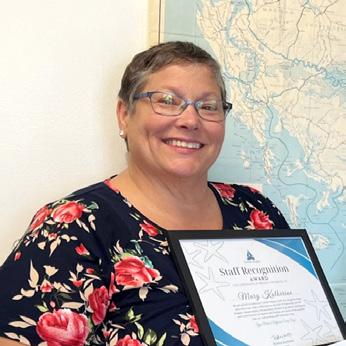


Dr. Mark L. Bowen
Chief People and Culture Officer has received his SHRM Inclusive Workplace Culture Specialty Credential.

Alvin Harmon Bereavement Care Services Manager and Compass Program Manager is now a member of the National End-of-Life Doula Alliance Board of Directors.

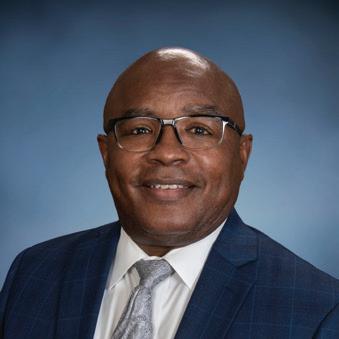
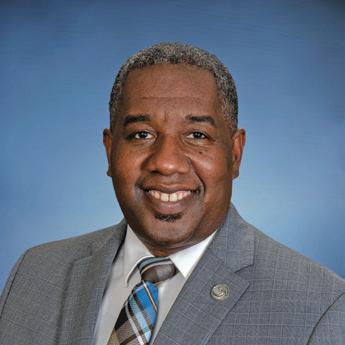

Jessica Schempp Human Resources
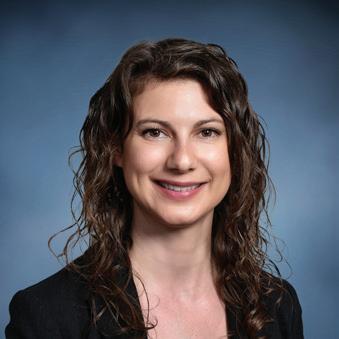
Manager has received her Society of Human Resource Management Certified Professional Designation.

Marco Arredondo Facilities Coordinator successfully completed the Certified Healthcare Environmental Services Technician Program.


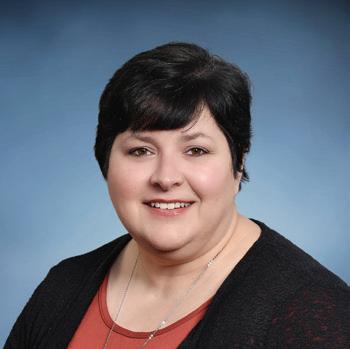 By Ann Lovely
By Ann Lovely
Quality care is achieved when a person’s care is in alignment with their goals, wishes, and values. Helping patients and their families get the care they need and the care they want is best practice, and critical. Engaging our patients in meaningful goals of care conversations is important in providing high quality and individualized care that clearly details the person’s wishes regarding specific treatments, intensity of care, planning for future care, and advance care planning.
While these conversations might be difficult at times, effective communication plays a major role in facilitating goals for a person living with a serious illness that is life-limiting. These conversations should happen early and should happen often. When having these conversations, it is very important that providers assess the patient’s knowledge and understanding of their illness and prognosis. As hospice clinicians, we understand that patients (and families) facing a life-limiting illness have many concerns. These compassionate conversations help us understand what matters most to our patients and their families while allowing us to provide them with the appropriate information to make medical decisions that align with their needs and values.
In order to make plans for their future, it is important for the patient to be knowledgeable of the expected course their condition may take and if they would like to make their own decisions about their care or if they would like to rely on someone else to make important decisions for them. Once the patient makes decisions regarding their goals and wishes, the clinician will summarize and document the conversation in medical records. Based on some of the decisions made, the clinician may assist the patient in filling out Advance Directive paperwork, MOLST form, updating their plan of care, or providing other community resources. It is important to remember that these decisions are not final. Often, during the course of the illness, the goals of care will be revisited to appropriately address clinical concerns and patient’s wishes.
Goals of care discussions should occur early and often to help clinicians to better match recommended treatments to a patient’s wishes and goals, thereby improving the quality of care. Having these conversations is not intended to reduce hope, it is to provide the patient and their family reassurance that their wishes will be honored and their goals for end of life care will be met.


 By Kathy Mirsky
By Kathy Mirsky
I am frequently asked why I would be performing physical therapy with Hospice patients. Isn’t physical therapy for strengthening and enabling people to return to work and other life activities? How does this fit with end of life care?
Fortunately, physical therapy goals for Hospice patients are very similar to those of the general population, only set into the framework of progressive deficits caused by disease and a limited time frame to address goals and to benefit from achievements. Strengthening, flexibility, endurance, pain reduction, mobility and independence, which are the most salient physical therapy goals, continue to be relevant with the Hospice population.
Many of our patients suffer brief setbacks, due to concerns such as modifications of medication, brief hospitalizations, hip fractures or other problems. With a short course of therapy, many of these patients are able to recover the skills they had prior and continue to function at their changed, though optimal, level.
As is expected, Hospice patients do experience declines but the use of physical therapy modalities such as massage, passive exercises, active and assisted exercises and facilitated mobility can help reduce pain, reduce edema, and improve mobility. This allows patients to participate more in their care and to optimize their degree of independence. It is a true emotional and psychological boost for a person to be able to perform independently at least some, if not all, of their own self-care. Exercise and mobility enhances production of hormones which promote arousal, improved mood and a sense of hope and wellbeing.
The importance of physical therapy intervention, along with the many other services Hospice provides, is to benefit our patients but also to provide support to their families, friends and caregivers. It is essential that all caregivers learn proper, safe, and efficient methods of physical
management for activities of daily living (ADL), transfers, and mobility. Back problems are an ever present concern, either prior to caregiving or exacerbated by it, and new injuries are frequently incurred with these activities when performed without knowledge of proper skills. The physical therapist can teach optimal postural alignment and procedures in order to prevent injuries to patients and caregivers. Use of appropriate equipment including gait belts, transfer boards, assistive devices for ambulation, wheelchairs and mechanical lifts with training for patients and caregivers not only meet mobility needs, such as transfers. They may actually expand possibilities for patients who might otherwise be relegated to remaining in their beds or in their bedrooms. Use of the wheelchair may allow a patient to get out onto the porch, roam around the neighborhood or visit with others, dependent upon their particular goals and desires.
One patient was referred who wanted to be able to get out of bed in order to go into the living room where the Christmas tree was beautifully decorated for the holidays. He was instructed, along with his family, in transfers from his bed to the wheelchair which, though difficult, were possible and which allowed him to go to the living room, see the tree and be able to celebrate around the tree with his family. Another family was instructed in safe transfers and related issues so that the patient was able to go out with her family for a last trip to the beach.
Physical therapists function as an essential part of the Hospice team in helping achieve the mission and vision of Hospice, supporting patients and caregivers as they desire, through the difficulties posed during the journey through end of life. It recognizes the continued value of life, despite its changing presentation for our patients and all who love and care for them.
Kathleen Mirsky is our physical therapist.
To learn more about physical therapy in Hospice, please contact her by e-mail at KMirsky@coastalhospice.org or by phone: 410-742-8732
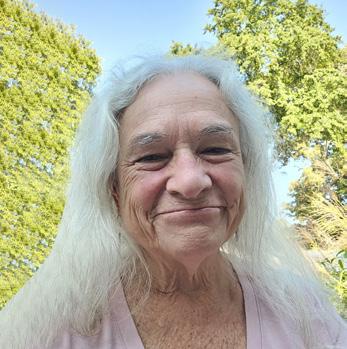
Do you dream of making a transformational
to the world about who
kind that creates a better future? A gift that leaves a lasting
about? Consider making a gift through your will or trust
All it takes is a simple addition to your existing documents We can provide you sample language to give to your attorney

You can easily alter or revoke your gift down the road if needed
Give a specific asset or percentage of your estate Support a particular program or let your gift go where it's needed most
A special person you wish to honor? A gift through your will makes a beautiful tribute gift
When you leave us a gift in your will or trust, you build our long term financial strength and enable us to continue to help your community long into the future.

To
your
www.coastalhospice.org/plannedgiving/
Tammy Patrick Director of Advancement 410 742 8732 ext 515 tpatrick@coastalhospice
On our Summer issue, we unintentionally used incorrect iconography to illustrate our Spiritual Care. Coastal Hospice’s Spiritual Care Professionals do not represent a specific faith perspective when providing care.
Do not miss the interview that our own Stephanie McClellan, Volunteer Services Coordinator and Steve Farrow, Volunteer and past board chair did at WBOC’s Delmarva Life. Thank you Stephanie and Steve for sharing this timely information with our community! http://www.delmarvalife.com/paidcontent/paidcontent-by-coastal-hospice-volunteers-needed/
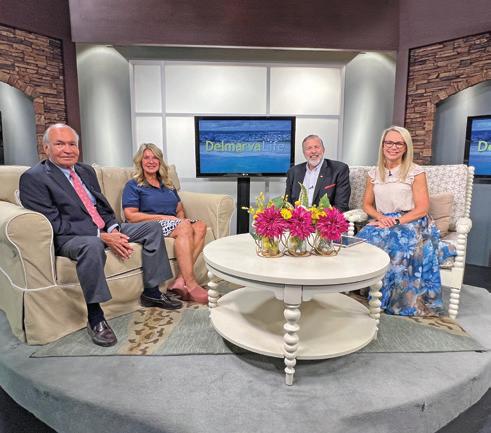
Coastal Hospice, Inc. PO Box 1733 Salisbury, MD 21802 www.CoastalHospice.org
Non Profit Organization U.S. Postage PAID Salisbury, MD Permit No.94 410-742-8732 410-742-7866





Follow us online: facebook.com/CoastalHospice
@CoastalHospice @CoastalHospice